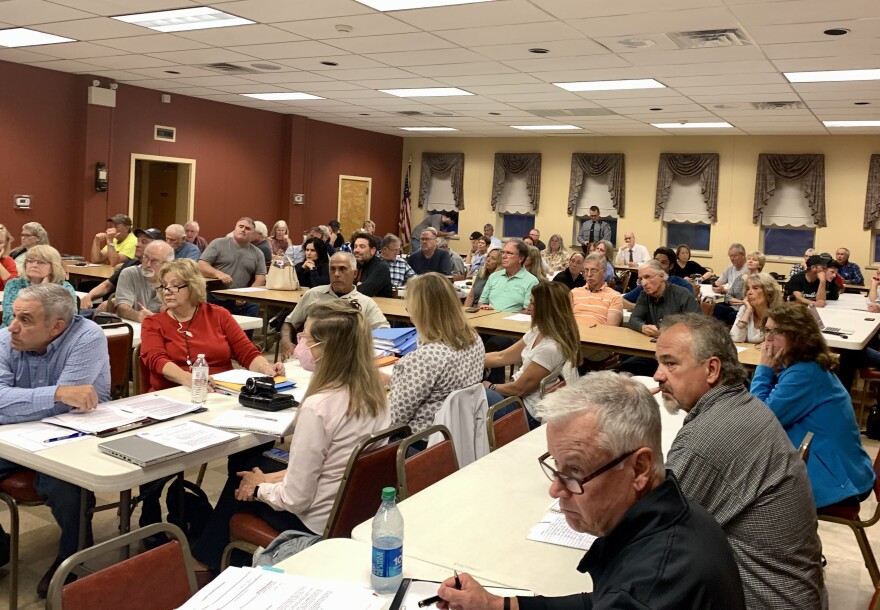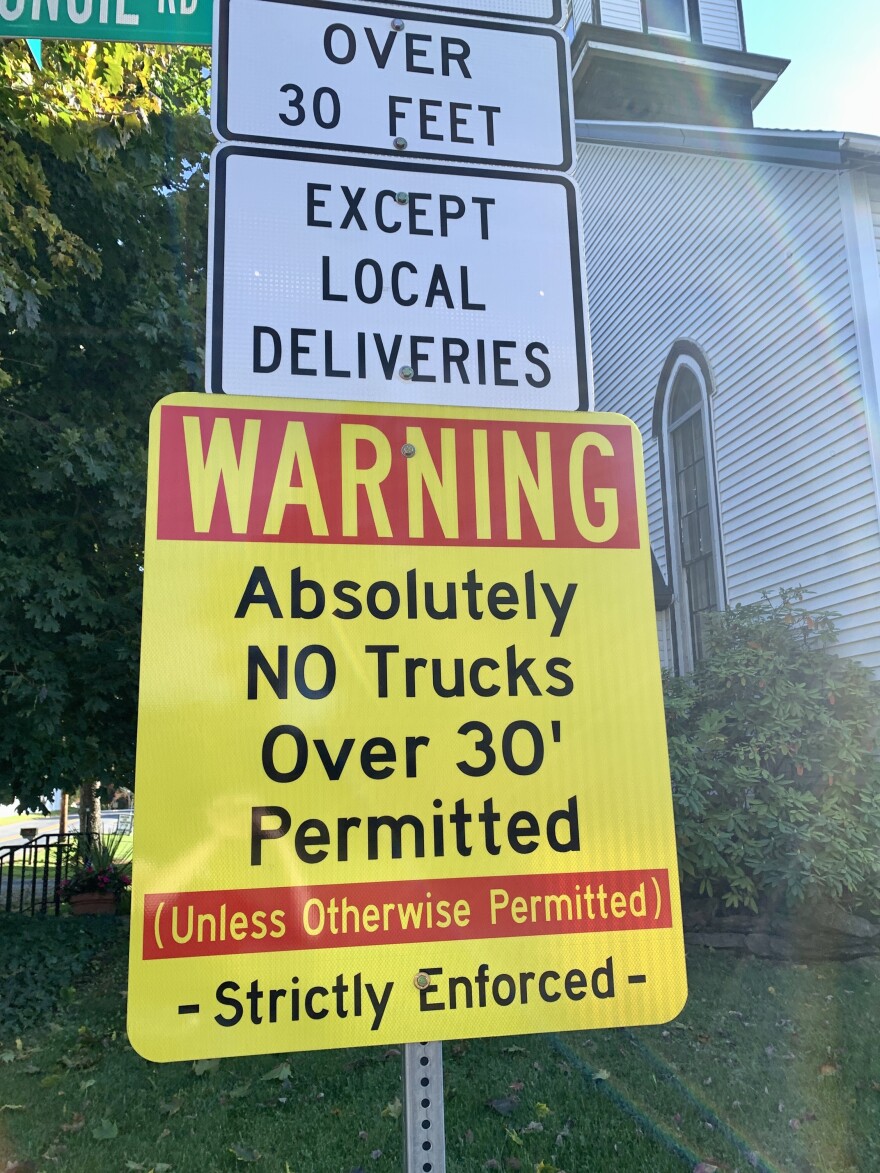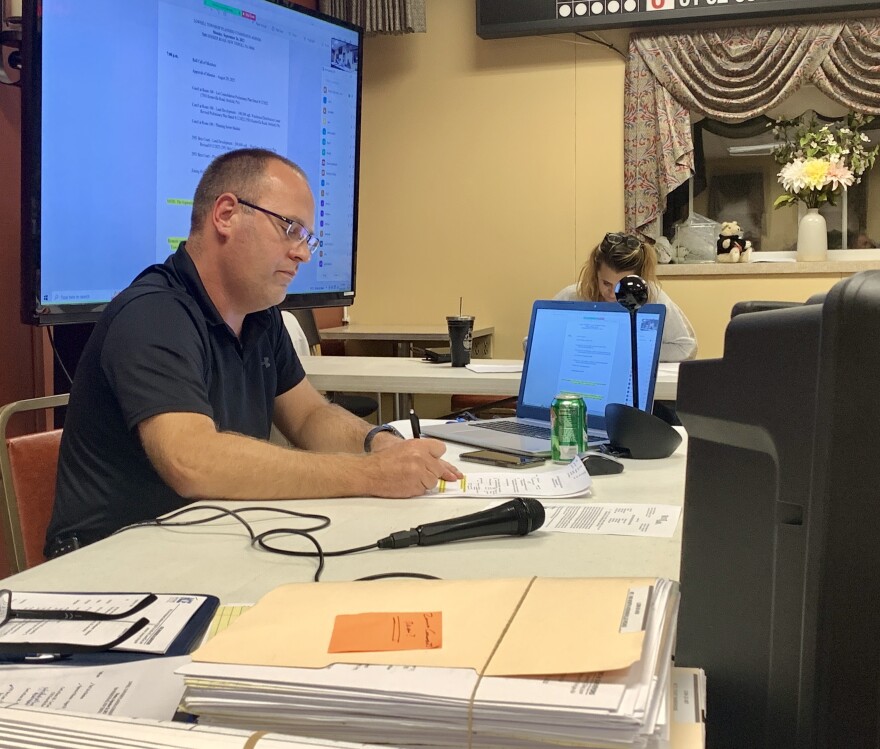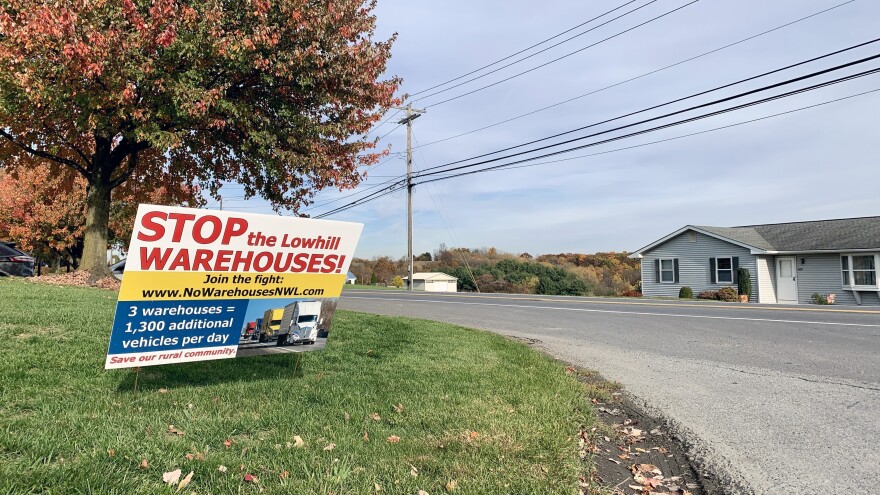LOWHILL TOWNSHIP, Pa. – Lowhill Township is a small municipality of about 2,100 residents in the northwestern Lehigh Valley.
It’s also the potential location for three new warehouses totaling more than 700,000 square feet.
And residents are fighting back.
- Three warehouses are proposed in Lowhill Township, a northwestern Lehigh Valley municipality. A resident group is trying to stop them
- Many have tried to stop warehouse development in the past with little success because if developments meet the municipality's zoning ordinances, there is nothing local governments can do to stop them
- Local officials say warehouse development should only happen in places that have the infrastructure to support it, which can be achieved through revising zoning ordinances
Resident group Northwestern Lehigh Residents for Smart Growth has brought dozens of residents to township planning board and board of supervisors meetings, hired a lawyer and read through zoning ordinances and state laws, trying to find any way it can to stop the warehouses.
Jack Iannantuono, a member of the citizen’s group, said the warehouses would be built at a place that doesn’t have the infrastructure to handle it.
“It's a square peg in a round hole,” Iannantuono said. “You're putting warehouses three miles away from a major highway, up steep grades, and without the shoulders and infrastructure to handle the volume.”

The fight against warehouses in Lowhill Township mirrors one that has happened many times in the Lehigh Valley, with residents trying to stop big developments they say will affect their quality of life.
But if history is any indication, the people of Lowhill Township have many challenges ahead.
Warehouses in the Lehigh Valley
The Lehigh Valley has become a prime spot for warehouses because of it's near major cities and has access to interstate highways.
That has led to an explosion of warehouse development in the region in the past decade.
Lehigh Valley Planning Commission’s 2021 annual report found that over six years, 27 million square feet of new warehouse space was approved by local governments, and 16.5 million square feet more was in the process of being approved.
In a 2018 survey conducted by LVPC, more than half of residents said warehouses were their least favorite part of living in the valley, and two-thirds said it was truck traffic.
Residents recently tried to stop warehouse development in Upper Macungie Township, Palmer Township, Moore Township and Plainfield Township, citing concerns about truck traffic, air pollution and noise.
“The reality is that the industrial growth in total… has greatly increased job availability, has reduced unemployment, has increased wages, and median income."Don Cunningham, president and CEO of the Lehigh Valley Economic Development Corporation
Don Cunningham, president of Lehigh Valley Economic Development Corporation, said resident frustrations have caused them to fight against every horizontal industrial development, even though they vary greatly in their use and impact on the surrounding community.
Cunningham said he understands residents' concerns, but in general, industrial development has been good for the valley.
“The reality is that the industrial growth in total … has greatly increased job availability, has reduced unemployment, has increased wages and median income,” Cunningham said.
Cunningham said he only supports industrial development where there is the infrastructure to handle it.
Learning from history
One of the residents who has tried to stop warehouse development is Ron Beitler, who now serves on the Lehigh County Board of Commissioners.
In 2010, Lower Macungie Township commissioners tried to change the zoning for 700 acres to allow for new warehouses. Beitler was the spokesman of a citizens group that sued Lower Macungie and a developer to stop the rezoning.
Beitler’s group won favorable rulings in lower courts, but the developer kept appealing until a judge required the group to post a bond to pay damages to the developers if it lost.
“That was kind of game over, because we were just a resident group, so we didn't have a whole lot of money, and the developers had deep pockets, to say the least,” Beitler said
Beitler said the warehouses in Lower Macungie and the surrounding area create more liabilities than opportunities.
He said trucks from the warehouses cause physical damage to roads and signs, increase traffic and pollute the area.
“Everything they [Lowhill Township residents] are arguing is 100 percent accurate,” Beitler said. “Like, it's coming. It's not just hysterics or anything.”

But even though Beitler supports the fight against the warehouses in Lowhill, he said that if a project’s land use application meets zoning ordinances, there isn’t much residents can do.
“There'll be an appeal and you'll lose and it's going to cost your community a lot of taxpayer dollars to fight a fight that you're going to lose,” Beitler said. “And then the warehouse is going to get approved anyhow by the courts.”
Laws in PA
People trying to stop warehouse development in Pennsylvania have a hard time succeeding because of state law.
The 1968 Pennsylvania Municipalities Planning Code tells communities what they can and can’t do in terms of zoning. A part of that is municipalities have to zone for every type of use in their community and must allow for growth.
“A community can't just say, ‘I don't want any industrial development,’ or ‘I don't want any apartments,’ or ‘I don't want any of whatever it may be,’” said Becky Bradley, executive director of Lehigh Valley Planning Commission. “It's illegal for them to do that in Pennsylvania.”
The only exception is when municipalities take part in a multi-municipal comprehensive plan. A comprehensive plan is a guide for how municipalities are zoned, and if municipalities create a comprehensive plan together, they can ban certain uses in one of the participating municipalities if they are allowed in another.
Lowhill Township is part of a multi-municipal comprehensive plan with Slatington and Weisenberg, Lynn, Heidelberg and Washington townships, but it is one of the townships in that plan that allows for warehouse development.
The law also says that if a proposed development meets the area’s zoning laws, there is nothing the township can legally do to stop it.
“It is a very black-and-white issue with zoning. It wouldn't matter whether it was Brian Carl, or another person someplace else. Zoning decisions are not arbitrary or capricious. They are made under the terms of the municipal law in place at the time.”Becky Bradley, executive director of the Lehigh Valley Planning Commission
Former Lowhill Township Zoning Officer Brian Carl said throughout the process of the warehouse proposals that they meet the zoning ordinances for the township, so they couldn’t stop them from being developed.
The resident group disagrees.
“We don't have to just say, ‘Well, that's what's on paper,’” Ianntuno said. “There are interpretations. That's why there's judicial reviews... We're not just going to roll over.”
But Bradley said there’s not much interpretation when it comes to zoning ordinances.
“It is a very black-and-white issue with zoning,” Bradley said. “It wouldn't matter whether it was Brian Carl, or another person someplace else. Zoning decisions are not arbitrary or capricious. They are made under the terms of the municipal law in place at the time.”

Carl's resignation from his position was announced on the same night the Lowhill supervisors denied the plans for one of the warehouses on Oct. 6. Carl said he resigned because he was working for both Weisenberg Township and Lowhill, and the workload became too much.
Supervisors Chairman Richard Hughes said he expects the developers will take legal action against the township because of the vote.
Changing zoning ordinances
Beitler said that even though the warehouses he tried to stop were built, Lower Macungie residents ultimately won the fight against warehouses because the township changed zoning laws to prevent them as much as legally possible.
Beitler said concerned residents need to elect smart growth candidates who will change zoning laws before developers propose anything.
“Once you're faced with these hugely impactful, very large land use applications, at that point, it's too late,” Beitler said. “Your best offense here is a good defense, and that's getting your zoning code in order to avoid these fights altogether.
Lowhill and neighboring townships are putting together a new multi-municipal comprehensive plan. Once it is adopted, officials will revise the township’s zoning ordinances to meet that plan.
Bradley said the draft plan contains recommendations to remove warehouse use in areas that don’t have the proper infrastructure to deal with them, which could prevent any similar controversies.
“Once you're faced with these hugely impactful, very large land use applications, at that point, it's too late. Your best offense here is a good defense, and that's getting your zoning code in order to avoid these fights altogether."Ron Beitler, Lehigh County Board of Commissioners
But for the proposed warehouses, the township has to follow the zoning ordinances in place when the application was submitted, Bradley said.
New bill
A big issue local officials face is that they are only allowed to consider immediate impacts to the development site, meaning they can’t consider traffic implications further down the road.
Members of the resident group in Lowhill ran into that issue when they tried to argue that the proposed Betz Court warehouse would cause traffic issues on Route 100. But since the road is not directly connected to the property, the supervisors can't consider those traffic implications in their review of the plan.
But a new bill from state Rep. Michael Schlossberg would change that. He represents South Whitehall Township, part of Allentown and part of Upper Macungie Township.
“Let's say you have a scenario in which somebody wants to build a new warehouse and traffic studies come back and show that the current road half a mile downstream wouldn't be able to handle it,” Schlossberg said.
“You could require the development of additional traffic signals and road improvements in order to make that traffic flow smoother and thus minimize the impact on the neighborhood.”
The bill would require developers to provide a detailed analysis of the effects of development, including traffic, sewer, stormwater, wildlife and harm to neighboring properties.
It also would give neighboring municipalities an opportunity to express any concerns they have.
Schlossberg said he supports development, but he thinks there need to be more ways municipalities can control what that development looks like.
Schlossberg said he hopes his bill will be discussed in the next legislative session.
“In my mind, this is just the start,” he said.


